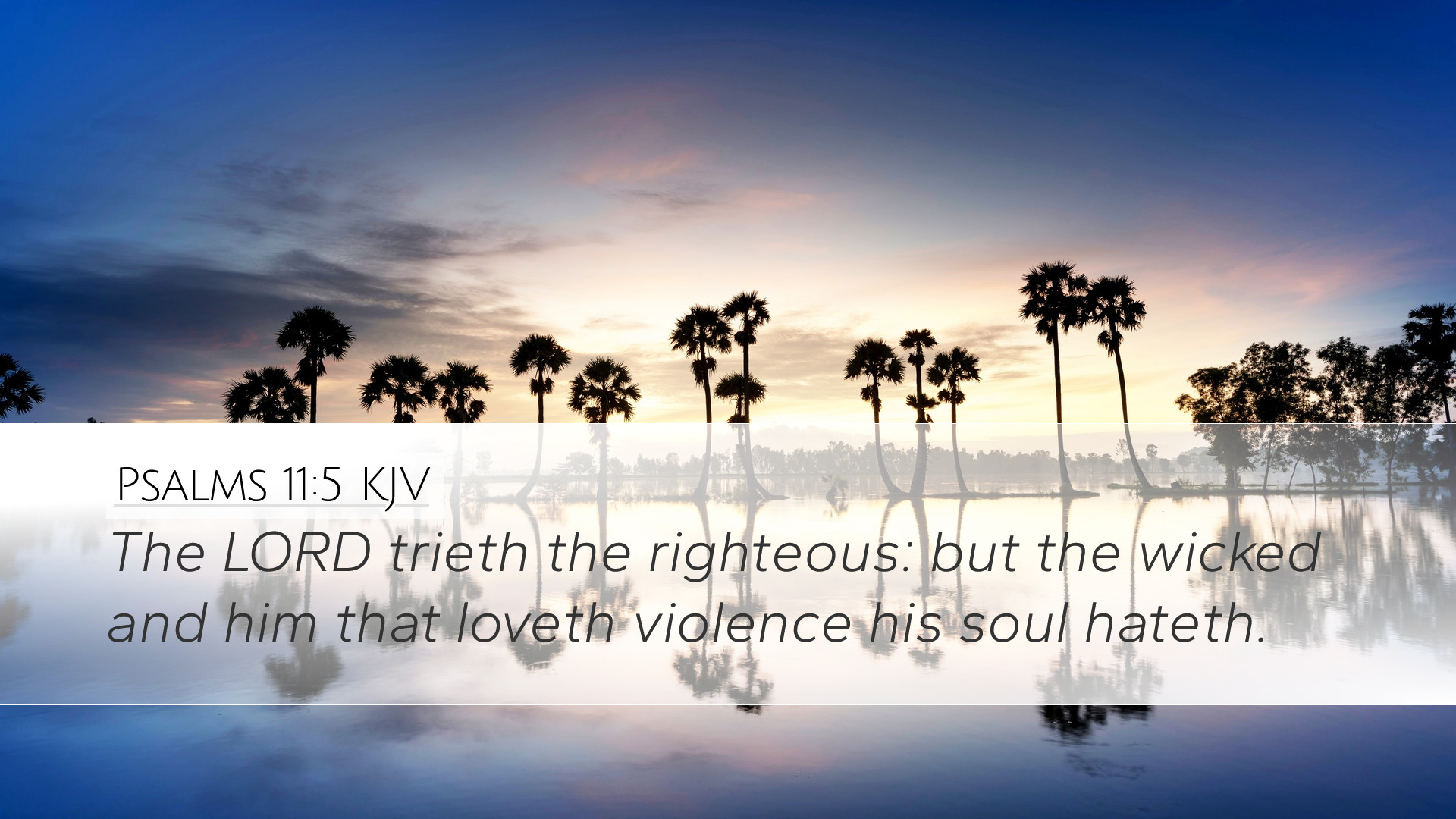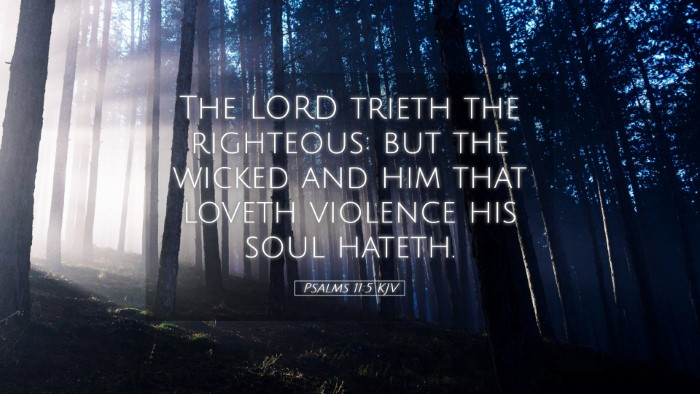Psalms 11:5 - A Commentary
"The LORD trieth the righteous: but the wicked and him that loveth violence his soul hateth."
Introduction
This verse, nestled within the context of Psalm 11, addresses fundamental themes of divine justice and moral integrity. It presents a stark contrast between the righteous and the wicked, revealing God's nature and His relationship with humanity. The insights from various public domain commentaries provide a rich framework for understanding the depth of this scripture.
Divine Testing of the Righteous
Matthew Henry's Insights: Matthew Henry emphasizes that God's testing of the righteous is not arbitrary or malicious. Rather, it serves to refine and purify believers, demonstrating their faith and resilience amidst trials. Such testing strengthens their character and fortifies their trust in God’s providence.
Albert Barnes' Perspective: Barnes adds that this testing is akin to the process of refining metals. The righteous endure hardship to emerge stronger in faith; their trials are an invitation to rely more deeply on God's strength and wisdom.
Adam Clarke's Commentary: Adam Clarke notes that the word “trieth” implies an examination of moral quality. The righteous, through their afflictions, demonstrate a steadfastness that God honors. This divine scrutiny leads to a deeper understanding of one's own spiritual condition.
The Fate of the Wicked
Divine Hatred towards the Wicked: This verse starkly contrasts the fate of the righteous with that of the wicked. The proclamation that “his soul hateth” indicates a profound and righteous disdain from God towards those embodying wickedness and violence.
Matthew Henry: He notes that God’s hatred of the wicked is rooted in their moral failure and propensity for violence. Those who pursue evil are not merely judged by their actions; they are ultimately estranged from the divine presence.
Albert Barnes: Barnes expands on this thought by suggesting that the “hatred” of God does not reflect a capricious disposition but a response to the wicked actions that stand opposed to His holy nature. The wicked are contrasted with the righteous, illustrating the just consequences of a life lived in rebellion against divine law.
Adam Clarke: Clarke also points out the significance of the term “loveth violence.” He argues that it reflects a deeper moral inclination toward evil. God’s aversion is not solely toward actions but also the heart’s affections that embrace violence and iniquity.
Theological Implications
This verse invites profound theological reflection on the nature of God as both just and merciful. The testing of the righteous and the judgment of the wicked exemplify God’s moral order.
- Justice and Mercy: The tension between justice and mercy is a recurring theme throughout scripture. While the righteous face trials, they are reassured of God’s presence and favor. In contrast, the wicked face judgment, which is a necessary consequence of divine justice.
- The Nature of Faith: The notion that God “trieth” can encourage modern believers to understand that trials serve as a means of spiritual growth. Faith is often tested, but this testing is not without purpose—it draws believers nearer to God.
- God’s Sovereignty: The verse affirms God’s sovereignty over human affairs. His discerning judgment reflects His omniscience, knowing the hearts of all people and their true inclinations.
Practical Applications
For pastors, students, and theologians, this verse provides meaningful principles for application in contemporary life.
- Encouragement in Trials: Pastors may draw upon this verse to encourage congregants facing difficulties, reminding them that trials can deepen their faith and reliance on God.
- Moral Integrity: The stark contrast between righteousness and wickedness serves as a call to uphold moral integrity, encouraging believers to pursue lives that reflect Christ’s teachings.
- Justice in Society: The acknowledgment of God’s hatred for violence invites a reflection on social justice. Believers are prompted to advocate for peace and righteousness in their communities.
Conclusion
In Psalms 11:5, we find a poignant reminder of God’s engagement with humanity—He tests the righteous while opposing the wicked. This verse captures the essence of divine justice and the necessity for personal moral integrity. Through the reflections of esteemed commentators, we gain a deeper understanding of our relationship with God in the midst of trials and the imperative to stand firm against the forces of wickedness in the world.


